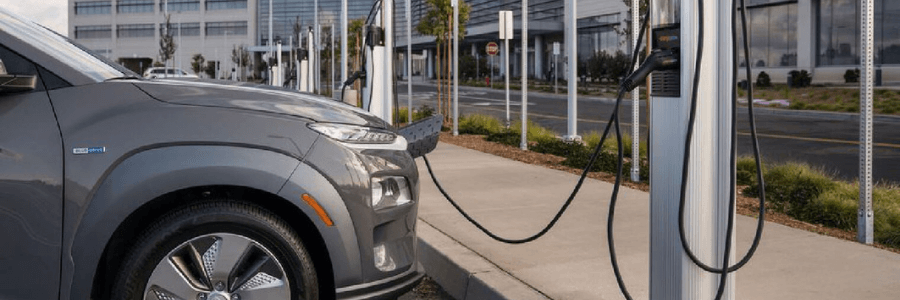How to Electrify Your Fleet: Your EV FAQs Answered!

It’s no secret in the automotive industry that this year saw a significant surge in electric vehicle sales. In fact, around 4.3 million new battery-powered EVs (BEVs) and plug-in hybrid electric vehicles (PHEVs) were sold globally in the first half of 2022. BEV sales grew by 75% on the year and PHEVs by 37%. And more growth is predicted for the rest of 2022, with sales expected to rise by 57% in the year to 10.6 million. Although they still make up a tiny portion of the total number of motor vehicles on North American roads today, electrification plans are accelerating across the continent, and we could be seeing as many as 2.9 million electric vehicles by 2028 alone—with a market growth rate of over 35%. And why wouldn’t we be? EVs are cleaner, cheaper to run, and more efficient compared to gas-powered or diesel vehicles.
So, what does this mean for businesses building commercial fleets? As more and more enterprises are seeking new ways to not only preserve their bottom line but also make sustainability a priority in the process, building a fleet comprised of electric vehicles is an attractive and advantageous option. Having helped countless businesses step towards a more sustainable future, here at Zeemac, we’ve compiled our most asked questions when it comes to commercial EV fleet leasing so you can get a better sense of what you’d be getting yourself and your business into.
1. Electric vs. Hybrid: What’s The Difference?
An EV works by converting power from a battery into energy which is then used to drive your car around. The electric motor replaces the internal combustion engine (ICE) found in traditional vehicles—and because all its power comes exclusively from its battery, it needs to be plugged into an electric power source to be recharged.
Hybrids, meanwhile, use both electricity and fossil fuels to power themselves. The electric motor works in combination with the gas or diesel engine to increase fuel economy and performance. In a conventional hybrid, the motor’s battery charges itself by converting and storing the thermal energy produced when the vehicle brakes, so no plug-in is required. Many cars combine these two technologies into what’s known as a PHEV, or plug-in hybrid electric vehicle.
PHEVs work like conventional hybrids, but they have larger batteries that must be charged via a plug. This means they can cover greater distances running on pure electricity before the charge runs out and the engine kicks in, but you must plug it in regularly to achieve maximum fuel economy.
2. Are All-Electric Fleets Cost-Effective?
Although the upfront costs of an EV fleet seem high, studies have shown that, over its lifetime, it will end up being cheaper than its conventional counterparts. There are zero fuel costs and fewer components to replace. The parts that are there also wear out slower—meaning maintenance costs are typically far lower over the vehicle's lifetime. Coupled with various existing or planned EV tax breaks and purchase incentives, the total cost of owning electric vehicles drops significantly. Moreover, the cost of electricity per mile is on average just 50% of the cost of gasoline required to cover the same distance.
3. Are EVs Reliable?
Electric vehicles today are just as reliable as any gas-powered or diesel vehicle would be, depending on the make and model as well as how well you take care of them. If anything, you’ll have fewer mechanical parts to worry about—things like spark plugs, valves, drive belts and other components that often fail or wear out and can leave you stranded on the road. Moreover, the technology used to store energy from braking causes less wear on the brake pads compared to traditional vehicles.
When it comes to the battery—the most important part of an EV—it can take from 10 to 20 years before you need to replace it if maintained properly. Most manufacturers provide warranties for at least eight years or 160,000 km, which can be even higher for commercial vehicles.
4. How Far Do Your Drivers Travel?
This is an important question to ask because the range of your electric vehicles needs to be suitable for the routes travelled by your fleet. If you need a vehicle that will cover really long distances between stops, then your options might be limited.
It all depends on the size of the battery, but typically a 240km round trip should be within the capabilities of most electric vehicles currently available. So, if you operate within a small area and don't need to cover long distances regularly, then an EV could be ideal.
5. Will You Have Access to Reliable Charging Points?
As with any change in fleet operations, changes in your charging infrastructure can come with significant upfront costs. Not only do these new electric vehicles require specific charging points (which are different from standard plug sockets), but you’ll also have to account for the time required for charging.
It can take anywhere from 1 to 6 hours for an electric vehicle to recharge, depending on the capacity of your charging points—whereas a standard vehicle can be refuelled quickly at any standard filling station. Thankfully, Zeemac’s partnership with ChargePoint makes access to charging solutions easier than ever!
6. Are There Any Incentives or Rebates?
This is a big reason businesses are incorporating electric vehicles into their fleets. Building an EV fleet isn’t just saving the planet – it's saving GTA businesses money as well. In fact, residents, businesses, non-profit organizations, and local government organizations leasing or buying a new electric vehicle in some provinces are eligible for up to $3,000 off the after-tax vehicle price, thanks to the government’ programs like the Go Electric program. For many, that could allow a new electric vehicle to pay for itself.
From electric vehicle leasing solutions to tailored programs to meet your operational needs, EVOLVE ensures a smooth transition as you build and manage your electric vehicle fleet. Let the team at Somerville Auto take care of all your electric vehicle fleet leasing questions! We’ll always provide the expert advice you need to make the best decisions for your business. Contact us today to learn more about how electric vehicle leasing can benefit your business!
Contact Us
Leave us a voicemailor send us a message
Give us a call, or click here to send us a message!
Or visit us: 75 Arrow Road, North York, ON M9M 2L4
(Click above to get directions)
